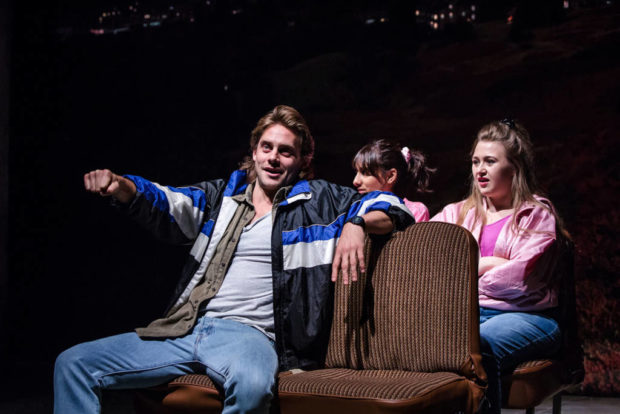You have no items in your cart. Want to get some nice things?
Go shopping
It’s a performance that almost never was. Back in December the Royal Court announced that they would no longer be staging Out of Joint’s Rita, Sue and Bob Too on their Sloane Square stage. The play was originally directed by Max Stafford-Clark in 1982 and he was also due to co-direct this revival. Three days into rehearsals he was forced out of the theatre company he founded following allegations of inappropriate behaviour and harassment.
Caught in a compromising position, and perhaps concluding there was little appetite for a play about a 27-year-old man grooming two 15-year-old girls in the light of high profile assault allegations, Royal Court artistic director Vicky Featherstone pulled the plug. Two days later she changed her mind, rightly concluding that the actions of an abusive man shouldn’t silence the voice of a working class female playwright. Andrea Dunbar was only nineteen when she wrote Rita, Sue and Bob Too, by which point she had given birth to three children and spent time in a women’s refuge.
The opening scene of this production, in which Bob (James Atherton) makes increasingly inappropriate remarks to his teenage babysitters before having sex with each in turn, was naturally extremely uncomfortable. During the prolonged sex scenes the house lights were raised, leaving the audience’s awkward reactions exposed. It was a childish move given the circumstances, and one that encouraged at least one walkout. The image of Rita’s spindly legs splayed as Bob thrusts between them remains burnt onto my retinas.
This revival could easily have been unwatchable in the current climate, but on the whole it had a surprising lightness of tone. Director Kate Wasserberg makes much of the wit of Dunbar’s quickfire dialogue, while the seriousness of Bob’s abuses of power festers beneath the surface. Bob’s actions are undoubtedly monstrous, yet Atherton plays him as a petulant child. His eagerness for the girls to put on and remove his condom is like a boy playing at being a man. Feeling emasculated after losing his job, Bob craves the affection and idolisation of the teenage girls.
More importantly, Rita (Tay Atwal) and Sue (Gemma Dobson) are far from passive victims: they are witty, vibrant and sometimes cruel. Out of the two Atwal was marginally more absorbing, delicately handling her character’s shifts in mood. Both were fantastic. Scenes such as a game of kiss chase on the meadow let us glimpse events through their eyes, where Bob is a portal to adult adventure. Wasserberg brings to life the many moments in Dunbar’s text where women silently get one over on posturing men. When Bob leaves and Sue asks “Do you think he believes we were a virgin?”, it’s a relief to know that in some ways Bob is being strung along too. It’s Rita and Sue who normally ask Bob for “a jump”, sometimes treating him like a fairground attraction.
The silent victories of women are mirrored in the older generation with the excellent Sally Bankes and David Walker as Sue’s hidebound parents. Walker’s oafish, vest-wearing patriarch is always trumped by the stubborn resolve of his wife. Their personalities have stiffened under difficult circumstances; it’s a pessimistic vision of the future that awaits Rita and Sue. Sue’s parents also show that the play is about more than sexual abuse. From Bob’s ill-advised mullet to the gorgeous Bradford backdrop and (less effectively) the slo-mo distortions of Tainted Love and Ashes to Ashes, the performance is strongly imbued with a sense of time and place. The play highlights the poverty but also the irrepressible charm of the Bradford in the ’80s as the characters weather the storm of Thatcher’s government.
In the fantastic final scene, three generations of women meet by chance at the pub and pick over the wreckage of the play’s events. It is of course very sad, but the character’s natural will to keep on going without so much as a complaint is what brings hope to this otherwise bleak drama. Yes, plays like Rita, Sue and Bob Too need to play a part in the conversation about sexual abuse, no matter how uncomfortable that makes people feel. But Dunbar’s play is also a treasure in its own right, and we shouldn’t let a Weinstein, Spacey or Stafford-Clark overshadow its candid and spirited take on a place and people that often go unrepresented.
Rita, Sue and Bob Too continues at the Royal Court Theatre until January 27. Tickets are available from £12.

About Simon Fearn
Simon is a student at Durham University and aspiring theatre critic. He has reviewed at the Edinburgh Fringe with EdFringeReview and is Stage Editor for Durham's student newspaper, Palatinate. He has also written music reviews for W!zard Radio and Cuckoo Review.




